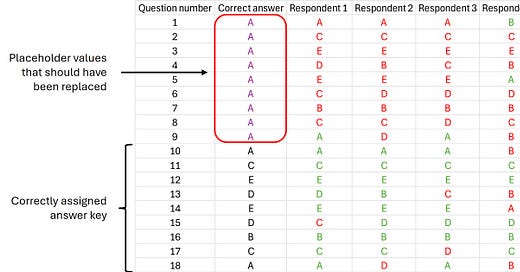In February this year, the Royal College of Physicians announced that of 1,451 doctors who took MRCP Part 2 written in September 2023, 283 who had been told they had passed had actually failed whilst 61 who had apparently failed had in fact passed.
This monumental screw up has been attributed to a data upload issue from the digital exam provider to the MRCP(UK) system led to the use of incorrect values during the scoring process. In a nutshell, the company that runs the online exam sends the college the respondents’ answers to each question but does not mark the exam. It’s up to the college to “mark” each question by comparing the respondent’s answer with the answer key. These temporary values should have been removed and replaced with the correct answers below.
Below, I’ve done a mock-up of what I think has happened. I’ve used Excel here as it’s completely understandable how you could really balls this up using Excel. For questions 10-18, the correct answer is in correctly displayed in the second column but for questions 1-9, the placeholder value of “A” is still there. You can see that there are a lot of wrong answers here which would make the exam seem harder than it is, thus lowering the pass mark when test equating is applied (a technique that uses the absolute values of how well the questions are answered to weight the exam which is supposed to keep how easy it is to pass the exam year on year constant).
At the time, the unusually high pass rate was flagged but not pursued further because the score distribution appeared typical. The error only came to light in early 2025 during a routine exam-setting meeting, when inconsistencies were noticed in performance data for certain questions.
Never events
In healthcare, never events are defined as “serious, largely preventable patient safety incidents that should not occur if relevant preventative measures are in place”. These are things like removing the wrong kidney or feeding through a misplaced NG tube.
Unfortunately, this is not the first of these kind of errors that play hard and loose with real lives. In 2023, the RCP announced that there had been an error in PACES examination marking leading to the wrong assignment of pass/fail for a small number of candidates. Just today we have found out that there are newly graduating doctors who have no idea where they are going to be shipped off to for FY1 with only a few months to go.
Even after the recent error had been recognised, the college continued to blunder on in its communications. They sent out an email to the affected parties at 5pm leaving next to no time for doctors to process this news and get in touch with the college. This is huge life-changing stuff - for those who had thought they had passed and moved on with life and careers, only to be told that they are going to have to rewind their life.
So, I am proposing that we should have a list of Never Events in the way we deal with and look after doctors’ careers. For exams, there needs to be a closed loop system with more robust built in checks and balances - think like a LIMS for transfusion. Are the college using an Excel spreadsheet to do this work? Possibly! The list should include:
Issuing Incorrect Pass/Fail Results
Candidates receive the wrong outcome due to scoring, data transfer, or system errors.Loss or Corruption of Exam Data
Candidate answers, marksheets, or scores are lost, overwritten, or unrecoverable.Failure of Exam Standard Setting
Errors in statistical equating that affect pass marks.Breaching Candidate Confidentiality
Personal or performance information is accidentally shared or publicly exposed.Failure to Notify Candidates of Errors in a Timely Manner
Delays in acknowledging or correcting errors that affect candidate outcomes.Technical Failures Preventing Candidates from Completing the Exam
System crashes or access problems during digital exams without a contingency plan.Exam Papers Leaked or Compromised
Questions reused improperly or exam integrity compromised due to security lapses.Marking Schemes Mismatched to Questions
Inconsistencies between what candidates are assessed on and how they're scored.Unjustified or Uncommunicated Changes to Exam Format or Content
Substantive changes made without sufficient notice or guidance to candidates.
Finally, I’m sorry but offering a refund and a free resit just doesn’t cut it. The affected individuals are due compensation paid at market rate for the additional time, expense, lack of career progression etc… There should also be more debate about the remedial action needed here. Do we really need to take a very safe medical registrar, who has passed PACES and is now well into their training, right back to MRCP Part 2?
In my humble opinion, for people who had actually passed but been told they had failed, the compensation should amount to:
Refund of resat exam
Compensation for extra studying paid at at least £100 an hour (guestimate ~£10,000)
Compensation if career progression delayed paid at rate of expected salary at final year of NHS service - so the difference between earnings during period of delay and a final consultant salary ~£70,000.
If these figures seem unrealistic, then that is not the point. The point is that they are fair. Colleges must have or should have insurance for this kind of thing.




